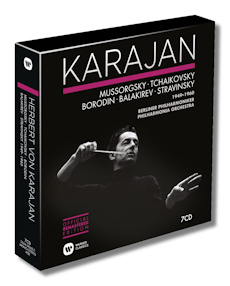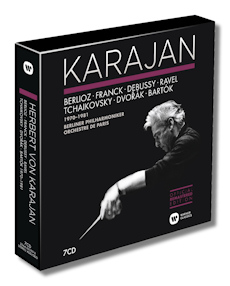
The Internet's Premier Classical Music Source
Related Links
-
Balakirev Reviews
Berlioz Reviews
Bizet Reviews
Borodin Reviews
Chabrier Reviews
Debussy Reviews
Dvořák Reviews
Franck Reviews
Gounod Reviews
Mascagni Reviews
Mussorgsky Reviews
Prokofieff Reviews
Puccini Reviews
Ravel Reviews
Smetana Reviews
Stravinsky Reviews
Tchaikovsky Reviews - Latest Reviews
- More Reviews
-
By Composer
-
Collections
DVD & Blu-ray
Books
Concert Reviews
Articles/Interviews
Software
Audio
Search Amazon
Recommended Links
Site News
 CD Review
CD Review
Karajan Official Remastered Edition

Russian Music (1949-1960)
- Mili Balakirev: Symphony #1 in C Major
- Alexander Borodin: Polovtsian Dances from "Prince Igor" (Mono & Stereo Versions)
- Modest Mussorgsky:
- Khovanshchina (Act 4 Entr'acte & Dance of the Persian Slaves)
- Khovanshchina (Excerpts) 1
- Boris Godunov (Excerpts) 1
- Pictures at an Exhibition (orch. Maurice Ravel)
- Serge Prokofieff: Peter and the Wolf, Op. 67 2
- Piotr Ilyitch Tchaikovsky:
- Swan Lake Suite, Op. 20 (Mono & Stereo Versions)
- The Nutcracker Suite, Op. 71a
- The Sleeping Beauty Suite, Op. 66 (Mono & Stereo Versions)
- 1812 Overture, Op. 49
- Symphony #4 in F minor, Op. 36
- Symphony #4 in F minor, Op. 36 *
- Symphony #5 in E minor, Op. 64
- Symphony #6 in B minor "Pathétique", Op. 74
- Igor Stravinsky: Jeu de cartes
1 Boris Christoff, bass
2 Peter Ustinov, narrator
Philharmonia Orchestra/Herbert von Karajan
* Berlin Philharmonic Orchestra/Herbert von Karajan
Warner Classics 2564-63362-0 7CDs Mono/Stereo ADD


Karajan in France and Russia, 1970-1981
- Claude Debussy:
- La Mer
- Prélude à l'après-midi d'un faune
- Maurice Ravel:
- Bolero
- Alborada del Gracioso **
- La Valse **
- Rapsodie Espagnole **
- Le Tombeau de Couperin **
- Georges Bizet: L' Arlésienne, Suite #2
- Emmanuel Chabrier: Espana Rapsodie
- Charles Gounod: Faust-Ballet Music
- Hector Berlioz: Hungarian March from "La Damnation de Faust"
- César Franck: Symphony in D minor **
- Giacomo Puccini:
- Intermezzo from Suor Angelica
- Intermezzo from Manon Lescaut
- Pietro Mascagni: Intermezzo from L'Amico Fritz
- Antonín Dvořák:
- Symphony #8 in G Major, Op. 88
- Symphony #9 in E minor "From The New World", Op. 95
- Slavonic Dance #8 in G Minor
- Bedřich Smetana: The Moldau from "Ma Vlást"
- Béla Bartók: Concerto for Orchestra
- Piotr Ilyitch Tchaikovsky:
- Symphony #4 in F minor, Op. 36
- Symphony #5 in E minor, Op. 64
- Symphony #6 in B minor "Pathétique", Op. 74
** Orchestre de Paris/Herbert von Karajan
Berlin Philharmonic Orchestra/Herbert von Karajan
Warner Classics 2564-63359-3 7CDs Stereo ADD
To mark the 25th anniversary of the death of Herbert von Karajan (this 16 July) Warner Classics, now owning the EMI catalogue, reissues a substantial chunk of the Austrian maestro's legacy. The Official Remastered Edition, as it is called, will comprise 13 box sets regrouping his most remarkable orchestral recordings for EMI, in all 101 discs, spanning a period between 1946 and 1984. (Karajan's opera recordings are conspicuously absent, but will perhaps be covered in a separate edition.)
The new edition follows rather shortly after the two massive EMI boxes from 2008 which assembled everything Karajan cut for them, some 160 CDs of orchestral and operatic works. So quite understandably, for this redux Warner is betting a lot on the technical side, the remastering – an effort which in our age of the low-quality download and the mp3 can only be welcomed. The recordings were painstakingly remastered from the original sources in 24-bit/96kHz at the famous Abbey Road Studios in London.
Having sampled two of the boxes, there is no question that these recordings have never sounded better. The older discs featuring the Philharmonia Orchestra engineered by Douglas Larter in Kingsway Hall in the 1950s under the auspices of Walter Legge are now more ravishing than ever by their warmth and presence (granted, they have always been something of a treat). The enhanced clarity achieved by the remastering also sheds a new light on the performances with the Orchestre de Paris (the Franck and Ravel recordings from 1969-1971).
Whether this will be enough to convince collectors, owning already everything or most, to invest in yet another release is another matter. Yet with the thematically arranged boxes it could be tempting to consider a few favorites instead of buying the whole lot again. In this respect it's a shame that Warner didn't devote more care to the presentation. The CDs are kept in the typical clamshell boxes, while each disc is in a cardboard sleeve with a different photo of the maestro (but, alas, no original cover art as in the DG releases), track listing and recording details. Each box comes with a booklet, which copies part of the Richard Osborne text from the 2008 edition and a newly written essay placing the works within the context of Karajan's career.
The two boxes considered here highlight the Russian and French repertoire which was for Karajan (unlike most of his contemporary colleagues in the Austro-German tradition) a constant point of attention throughout his career, and in many ways a considerable success. Remarkably vivid and brilliant recordings of Balakirev's First Symphony (1949) and Mussorgsky's Pictures (1955-56) demonstrate Karajan's outstanding association with the Philharmonia Orchestra in its heyday. Of similar value are the Tchaikovsky Symphonies 4 to 6, as well the three Ballet Suites, in vintage mono or early stereo from the 1950s. Magnificently played (just listen to Dennis Brain's horn solo in the Fifth) and superbly produced, these are outstanding achievements, quite amazing for their time, and sounding totally different from what Karajan would do with these works some twenty years later (as we are reminded by the second box grouping the comparatively stentorian 1971 versions from Berlin, by contrast the least convincing of his manifold recordings of the Tchaikovsky symphonies).
The second box illustrates Karajan's forays into French music particularly well with excellent performances of Franck's Symphony (what ravishing timbres and carefully judged dynamics!) and Ravel's Rapsodie espagnole and La Valse with the Orchestre de Paris, but also a hedonistic 1977 Boléro with the Berlin Philharmonic, which Karajan turns into a brilliantly colored melodic study, aided by some magnificent solo work. Less distinctive are his Dvořák symphonies from the late 1970s in Berlin, big, dramatic and totally unidiomatic, or his post-romantic, Technicolor version of Bartók's Concerto for Orchestra - more than anything models of orchestral control.
Even a quarter of a century after his death, it's bizarre that the significance of Karajan's recorded legacy remains often underrated, snubbed or placed in the much too restrictive light of his final years in Berlin. A vast undertaking like The Official Remastered Edition, even if it is basically rehashing of what has been available several times before, should be sufficient to silence most of the prejudices and misjudgments. The variety of Karajan's repertoire and foremost his quest for musical perfection throughout the years remain quite astonishing – and a tough act to follow. No, not everything he touched was successful – not even in these boxes which claim to focus on the "best" – yet a survey of almost four decades, involving several different top orchestras, leading soloists, recording venues and producers, does prove that there was more than just one Herbert von Karajan and that unlike his detractors often surmise not everything sounded the same in his hands. Indeed, in all stages and situations, inspired or flawed, his boundless passion for music continues to speak from every bar and gesture.
Copyright © 2014, Marc Haegeman





















